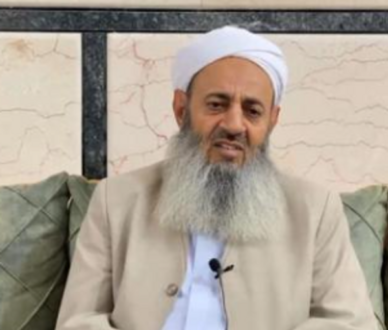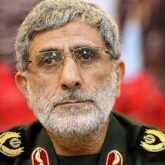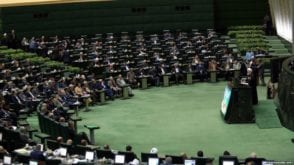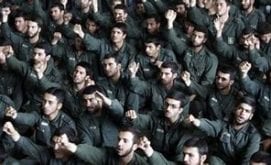Iranwire – Iran’s most prominent Sunni cleric has used his Friday sermon to urge the country’s Shia leadership to uphold international laws and standards on human rights, including equality between men and women, ahead of weekly anti-government protests in the southeastern city of Zahedan.
Molavi Abdolhamid, the Sunni Friday prayer leader of Zahedan, also called for accountability for the victims of a bloody crackdown on protests in the restive city in September 2022.
“Human rights and the rights of all Iranians, including women, must be respected, and we will pursue the rights of the victims of Zahedan’s Bloody Friday,” he said, insisting that women should be granted “equal rights and opportunities” as men.
Activists said there was a large presence of security forces in the city as hundreds of demonstrators took to the streets after Friday prayers, chanting slogans “Freedom,” “I will kill whoever killed my brother,” “We don’t want a child murderer government” and “Political prisoners must be released.”
Internet monitor NetBlocks reported a “significant disruption” to Internet connectivity, saying that it follows “a pattern of localized network blackouts on Friday afternoons targeting continued weekly political protests.”
⚠ Confirmed: Metrics show a significant disruption to internet connectivity in Zahedan, Balochistan #Iran in keeping with a pattern of localized network blackouts on Friday afternoons targeting continued weekly political protests pic.twitter.com/EjzVgxKTio— NetBlocks (@netblocks) March 10, 2023
Residents of Zahedan, the capital of Sistan and Baluchistan, have been holding protest rallies every Friday since September 30, when security forces killed nearly 100 people in the deadliest incident so far in nationwide demonstrations triggered by the September 16 death of a 22-year-old Kurdish woman, Mahsa Amini, in the custody of Tehran’s morality police.
The authorities have cracked down hard on the women-led protest movement demanding fundamental economic, social and political reforms.
More than 520 protesters have been killed by security forces and over 19,000 people have been illegally detained, activists say. After biased trials, the judiciary has handed down stiff sentences, including the death penalty, to protesters.
The demonstrations and clampdown on dissent have been particularly intense in the country’s western Kurdish areas and Sistan and Baluchistan, home to Iran’s Sunni Baluch minority of up to 2 million people.
🎞️ Protesters in #Zahedan after Friday prayers chanted: “Political prisoners must be released!” Thousands of protesters have been arrested since #IranProtests began in September 2022 after the murder of #MahsaAmini in police custody.#truth #IranRevoIution #IranProtests pic.twitter.com/kWMhsb1Q5F— IranWire (@IranWireEnglish) March 10, 2023
Molavi, who has been a key dissenting voice inside the country since the eruption of the nationwide demonstrations, said that “women and young people…need to have access to education and employment opportunities.”
“There are many women who work alongside men, and some even serve as the primary breadwinners in their families. It is imperative that these women are granted equal rights and opportunities as their male counterparts,” the cleric added.
For more than four decades, women in Iran have been subjected to discriminatory treatment regarding employment, education, clothing and inheritance, among other things.
🎞️ Despite heavy crackdowns and security forces surrounding #Zahedan‘s Friday prayers mosque, as well as disrupting internet access, protesters again marched after the prayer gathering and chanted: “Freedom, Freedom, Freedom!”#truth #IranRevoIution #IranProtests pic.twitter.com/0fULpm2KKv— IranWire (@IranWireEnglish) March 10, 2023
Molavi also said that all ethnic Baluch should have the right to have state-issued ID cards.
Without such cards, thousands of members of Iran’s minority group are deprived of access to basic government services, including medical care, monthly cash subsidies and education.
 Shabtabnews In this dark night, I have lost my way – Arise from a corner, oh you the star of guidance.
Shabtabnews In this dark night, I have lost my way – Arise from a corner, oh you the star of guidance.



